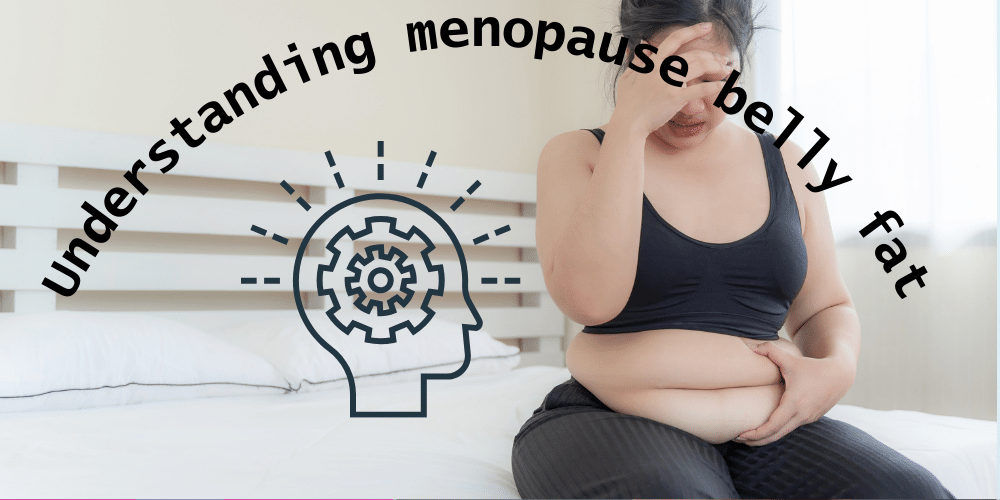How to Get Rid of Menopause Belly Fat: A Step-by-Step Guide!
Trying to get rid of abdominal fat can be very hard for women in 20’s but when you age it takes this challenge to a whole new level. When you’re younger you can lose body fat through diet and exercise. Trying to lose menopausal belly fat requires a more specific and complicated game plan.
Don’t get discouraged just yet, when you know and understand the problem you are dealing with, then you know how to solve it. That’s why I put together this step-by-step guide to help you fight back against menopausal weight gain.
Understanding Menopause Belly Fat
During menopause, the primary hormonal change revolves around the decline in estrogen levels. As women approach menopause, the ovaries gradually decrease in their production of estrogen, a hormone that regulates the menstrual cycle.
Another crucial hormone called progesterone also drops dramatically. This drop in hormones can trigger many symptoms, including hot flashes or night sweats, poor sleep, mood swings, and changes in fat distribution in the body, particularly around the belly. These shifting hormones disrupt the body’s typical metabolism (metabolism slows) and fat storage, causing what is often called “menopause belly fat.”

Why Meno Belly Fat is Unique
Menopausal belly fat is unique because of its link with hormonal changes in the body. Unlike other types of belly fat, which might be associated with lifestyle factors such as diet and lack of exercise, menopause belly fat is largely due to the shift in hormones that occurs during this stage of life.
This type of belly fat is often resistant to traditional weight loss methods and may require a specific approach to deal with it effectively. It’s not just about looks either, as menopause belly fat can also contribute to health risks like heart disease and diabetes, making it a critical area to address for overall health during and after menopause.
The Importance of a Healthy Lifestyle Habits
A healthy lifestyle is something everybody should maintain, but let’s face it it is easier said than done. Overall healthy living should be broken down into parts or a checklist so you know what you are supposed to do.
The Role of Diet in Managing Menopause Belly Fat
During menopause, hormonal fluctuations can lead to weight gain, particularly around the midsection. Managing menopausal belly fat requires adopting a balanced diet, including nutrient-dense foods like fruits, vegetables, lean proteins, and whole grains.
It’s important to limit alcohol intake, junk food, processed foods, sugars, and unhealthy fats while maintaining regular meal timings and portion control. Staying hydrated and incorporating foods rich in fiber can improve digestion and promote feelings of fullness. Pairing a well-balanced diet with regular physical activity is key to managing menopause belly fat and overall health during this period.
Recap things you need to focus on:
Balanced nutrition
Portion control
Incorporating essential nutrients
The Importance of Regular Exercise
Regular exercise is a crucial part of managing menopause weight gain and improving overall health. Physical activity helps to burn calories, increase metabolic rate, and maintain muscle mass, which naturally decreases with age. Especially during menopause, regular exercise can help offset the drop in metabolism and the tendency to put on weight.
Exercise isn’t just about weight management though. It’s also essential for heart health, bone density, mental well-being, and reducing risks of chronic diseases. Incorporating a mix of cardiovascular exercises, strength training, and flexibility workouts is what you should shoot for.
It’s recommended to aim for at least 30 minutes of moderate activity most days of the week. I suggest working all your major muscle groups at least once a week. Remember, it’s not about high intensity but rather consistency and making exercise part of your daily routine.
So while diet plays a significant role in managing menopausal weight gain, remember to move your body too!
Types of exercises for menopausal women
Strength training, also known as resistance or weight lifting, helps maintain muscle mass and bone density, which are typically affected during menopause. It also helps in boosting your metabolic rate and the fat-burning process.
Strength training can include:
bodyweight exercises
free weights
resistance band workouts
Cardiovascular exercises, on the other hand, are great for heart health and burning calories. Cardio workouts also help in improving mood and reducing anxiety, which can be beneficial during menopause.
Aerobic exercises include:
brisk walking
running
cycling
swimming
jump rope (my favorite)
It’s important to remember that the best exercise routine is one that you enjoy and can stick with. Always start slow and gradually increase the intensity and duration of your workouts.
Eventually, you will get to high-intensity interval training but don’t get discouraged if it takes you a couple of months to get there. Just keep pushing and you will reach your goals, I promise.
Check out these at-home workout machines to lose belly fat.
Supplements and Natural Remedies
Supplements can be a beneficial addition to a balanced diet during menopause, with Omega-3 and probiotics being among the most commonly recommended. Omega-3 fatty acids, found in fish oil, are essential for heart health and have anti-inflammatory properties. They are known to help reduce hot flashes and night sweats, common symptoms of menopause.
On the other hand, probiotics, the ‘good’ bacteria, can help in maintaining a healthy gut ecosystem, which is fundamental for overall health. They can help manage weight, boost immune function, and improve digestive health. Some research even suggests that probiotics can help alleviate psychological symptoms associated with menopause, such as mood swings and depression.
However, while supplements can provide health benefits, they should not replace a healthy diet and lifestyle they should be added to it. Before starting any supplement regimen, it’s critical to consult with your healthcare provider to ensure they are safe and suitable for your specific needs.
Check out these supplements to help manage your cortisol levels.
Lifestyle Changes and Stress Management
Stress has a huge impact on belly fat due to the role of cortisol, also known as the ‘stress hormone’. When the body is under stress, it produces excess cortisol, which can lead to a higher amount of visceral fat mass around the belly. This type of fat is particularly harmful as it surrounds vital organs and releases fatty acids into your blood, raising cholesterol and insulin resistance and leading to cardiovascular disease and diabetes.
Cortisol can also trigger emotional eating, or stress eating, causing cravings for unhealthy, high-sugar, and high-fat foods, leading to weight gain, particularly excess belly fat. That’s why managing stress effectively is a very important part of maintaining a healthy body weight and preventing the accumulation of stubborn belly fat.
The Role of Sleep and Stress Management in Menopause
Sleep and stress management play possibly the most critical roles in managing the symptoms of menopause and overall health. Sleep deprivation can intensify menopausal symptoms like hot flashes, mood swings, and irritability. It can also lead to weight gain as poor sleep disrupts the balance of key hormones that control appetite. Therefore, getting enough sleep becomes even more crucial during menopause.
Healthy sleep strategies include:
establishing a consistent sleep schedule
creating a comfortable sleeping environment
practicing relaxation techniques before bedtime
Stress management, on the other hand, is equally important. Chronic stress can lead to numerous health problems such as high blood pressure, heart disease, and obesity. It can also worsen menopausal symptoms. Implementing stress-management techniques like mindfulness, yoga, deep breathing exercises, or simple leisure activities in your routine can help regulate cortisol levels. By managing stress and prioritizing sleep, women can significantly improve their quality of life during menopause.

Stress management techniques such as:
meditation
yoga
deep breathing exercises
supplements
Tracking Progress
Keeping track of changes in your body is one of the most important parts of managing menopause and overall wellness. This involves carefully observing and recording any physical or emotional shifts you may experience. This could be anything from weight fluctuations, changes in menstrual cycles, vaginal dryness and mood alterations, to the intensity and frequency of hot flashes.
Regular self-monitoring can help you understand your body better, identify patterns, and detect any potential health concerns at an early stage. By consciously noting these changes, you can work more effectively with your healthcare provider to manage symptoms and tailor a health regimen that best suits your needs.
Remember, every woman’s menopause journey is unique – what works for one may not work for another. Therefore, being in tune with your body and its transformations is key to navigating this stage of life healthily and comfortably.
Some ways to help you keep track are:
Maintain a symptom diary: Note down the frequency and severity of symptoms like hot flashes, night sweats, mood changes, and any other physical or emotional changes you notice.
Track your sleep patterns: Use a sleep diary or a digital tool like a sleep tracker to monitor the quality and make sure you are getting enough sleep.
Monitor your weight: Regular weight checks can help identify any sudden or gradual changes.
Keep tabs on your exercise routine: Maintain a log of your physical activities, noting the type, duration, and intensity of each workout.
Regular health check-ups: Schedule regular appointments with your healthcare provider to discuss your symptoms, concerns, and progress.
Menstrual cycle tracking: For those in the perimenopause phase, tracking menstrual cycles can provide insights into changes in frequency and flow.
Mood monitoring: Keeping a mood diary can help identify any mood swings or emotional changes.
Nutrition tracking: Monitor your dietary intake to ensure you are getting the necessary nutrients.
Measure cardiovascular fitness: Regular checks of heart rate, blood pressure, and cholesterol levels can provide insights into your cardiovascular health.
Record cognitive changes: Note any changes in memory, concentration, and other cognitive functions.
I expect nothing less than for you to set a very ambious goal but it very important to set realistic expectations. Remember nothing happens overnight. But with dedication and the right approach you can have the body of your dreams (or your teens)!
Final Thought on Menopause Weight Gain
The primary focus of this guide is to manage menopause weight gain effectively. Key takeaways include acknowledging the physiological changes that occur during this phase and implementing strategies to manage them.
Key strategies include:
tracking sleep patterns
monitoring weight gain/ weight loss
logging physical activities
scheduling regular health checkups
tracking menstrual cycles
monitoring mood changes
monitoring dietary intake
measuring your cardio workout
recording cognitive changes
Setting ambitious yet realistic goals is crucial for success. Remember, change does not happen overnight, but with dedication and a well-thought-out approach, you can manage your body’s changes effectively during menopause.
The journey through menopause is a personal one, yet you are not alone. Every woman who is lucky enough to live a full life experiences these changes, and it’s important to remember that your health and well-being matter. Now is the perfect time to prioritize your health, embrace the changes, and take control of your body. Start by incorporating the aforementioned strategies in your daily routine and remember, every little step counts. Don’t hesitate to seek professional help if needed. Remember, the power to manage menopause effectively lies within you. So, take the reins, make informed decisions, and reclaim your health, because you absolutely deserve it!
Frequently Asked Questions
Why does menopause cause belly fat?
During menopause, your body’s estrogen levels decrease, which can lead to fat redistribution. This often results in fat accumulation around the belly area.
What can I do to lose body fat during menopause?
Healthy lifestyle changes like maintaining balanced eating patterns, incorporating regular exercise, and ensuring adequate sleep can help manage weight gain during menopause. It’s also recommended to limit intake of sugars and unhealthy fats.
Do certain foods contribute to extra weight around the belly?
Yes, foods high in sugars and unhealthy fats can contribute to weight gain, especially around your belly. Try for a diet rich in fruits, vegetables, lean proteins, and whole grains.
Does exercise help you lose weight during menopause?
Absolutely. Regular physical activity, especially strength training and cardio exercises, can help burn excess weight, especially around the belly and improve overall health.
Can hormone replacement therapy (HRT) help with weight loss during menopause?
While HRT can alleviate some menopausal symptoms, it’s not a guaranteed solution for losing belly fat. It’s best to consult with your healthcare provider about the potential benefits and risks.
How much exercise should I do to lose belly fat during menopause?
The American Heart Association recommends at least 150 minutes of moderate-intensity aerobic activity or 75 minutes of vigorous aerobic activity per week, in addition to two or more days of strength training.
What if lifestyle changes aren’t helping me lose belly fat during menopause?
If lifestyle changes aren’t showing results, it could be beneficial to consult with a healthcare professional or a dietitian. They can help create a personalized plan that suits your needs







